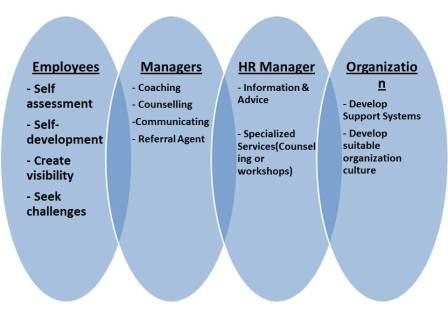Career Management | Role of Employees, Managers, Human Resource and the Company in career Development
Career Management | Role of Employees, Managers, Human Resource and the Company in career Development
Career Management and Career Development, which has already
been discussed in our previous two topics namely -
Stages of Career Development
Career Management Process.
Moving ahead,
it’s time to get more insights about the role played by four different stakeholders
in career development and overall career management.
Figure(1.1) sited
below shows the role undertaken by these four stakeholders at their respective
areas.
Employee’s Role in Career
Development: naturally no employees can remain silent as all the exercise
that takes place in the name of career
development is only meant for them? Hence active participation of employees
is mandatory. Precisely, individual employees should undertake the following responsibility
–
·
Try to find out career options
· Proper Utilization of development opportunities
·
Determine goals and career path
· To get convinced that career planning & development
are one’s own responsibility
· Evaluating key service areas of self and describe current
values, skills and interests and make sure these are used regularly on the job.
· To take feedback Initiative from managers & peers
with respects to their aptitudes, strong and weak points.
· Participation initiative for various assignments or
learning opportunities and interaction with different workgroups with regular intervals.
Manager’s Role in Career Development:
Managers play a significant key role in the process of employee career
development process. Ideally, managers are the only source of information while
deciding the readiness for job mobility (e.g promotion). Managers should be
effective in major four roles such as – coach, appraiser, advisor and referral
agents. More specifically, managers should be aware of the following –
· How can they act as a career advocate for their employees?
· How often they talk with their employees about career goals?
·
Do they provide candid feedback about their performance
so that employees can improve and grow further?
· Do they take career growth plans seriously and how much amount
of time they invest in?
· Do they keep their employees abreast of the future happenings
in the organization?
HR Manager’s Role in Career
Development: The role of Human Resource
Managers are felt more important in career development than in the rest of the
activities; they can provide more information or suggestions regarding prospective
career paths and training and development opportunities. HR leaders as
strategic partners should integrate and align organization vision and the
career development programs. They must re-evaluate the organization policy and
procedures that are designed to aid career development in the organization whether
are they –
·
Aligned with development choices?
·
Focused on future directions?
·
Driving new positive behaviours?
· Providing prospects for the employee at all levels to learn, grow
and develop within the organization?
Organization’s Role in Career Development: Companies
or organizations are expected to play a critical role in employee career development by providing with the resources desired
to be successful in managing their careers.
Resources may consist of specific developmental programs including processes
for employee career management such as –
· Career
workshops or seminars on the topic like how the career management system works
· Information boards like ‘newsletters’ and websites like ‘intranet’
for publishing internal job opportunities.
· Career planning printed workbooks or guides which can
direct employees through a sequence of guidelines related to career planning.
· Career counselling assistance from a trained career
counsellor for employee career issues.
· Develop & publish Career paths or career ladder to
provide valuable information regarding the possible directions and career opportunities
available in the organization.
An organization is also required to monitor and ensure
that career development programs are being utilized by the managers &
employees as it was intended for. Further, to review the system to see whether it
is helping the company to meet its objective as anticipated or not.
Related Post
Training & development

Comments
Post a Comment
Please do not add any spam link in the comment box